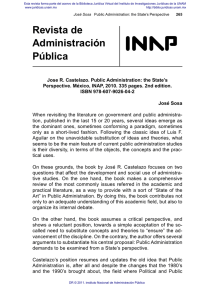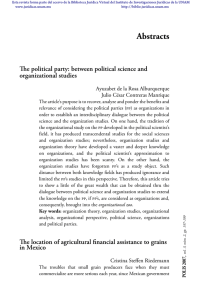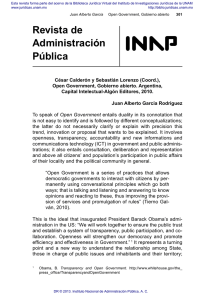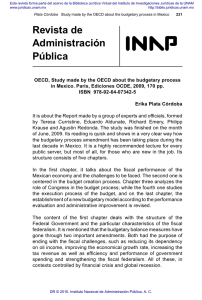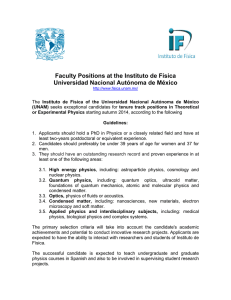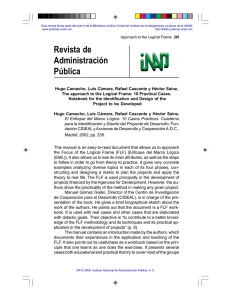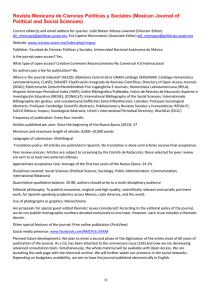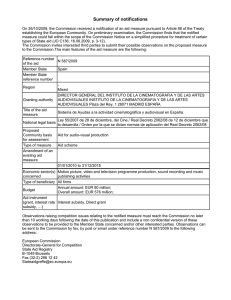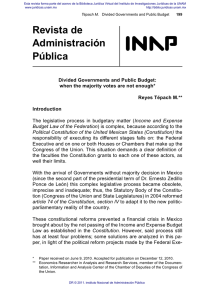THE REFORM, APPROXIMATION AND HARMONIZATION OF
Anuncio
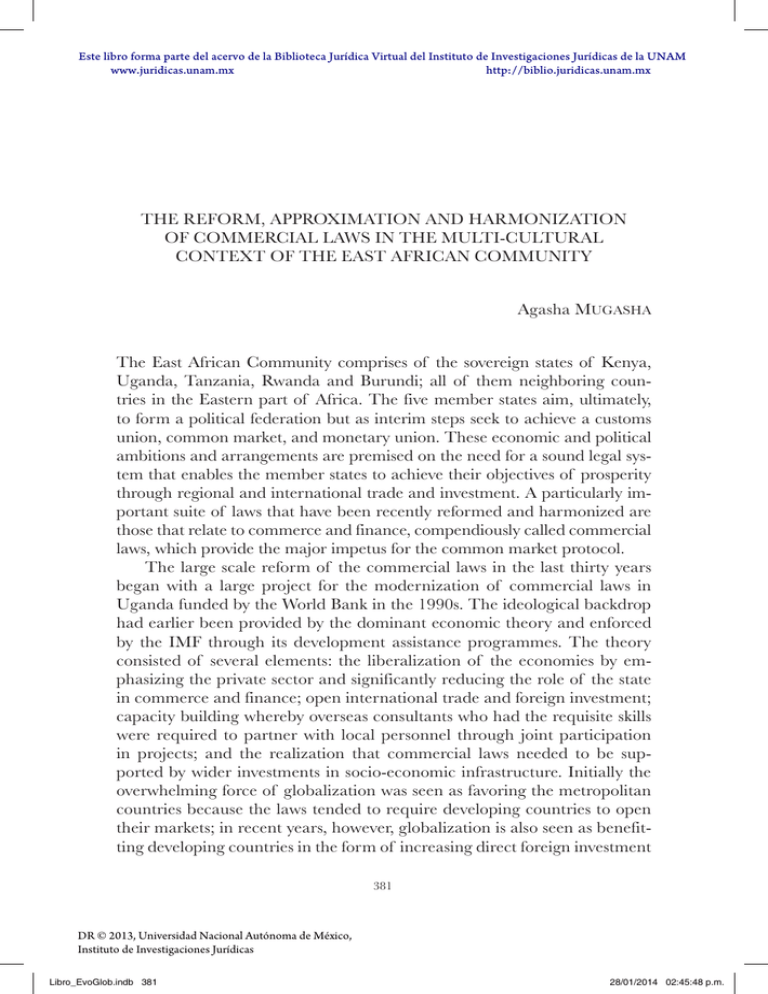
Este libro forma parte del acervo de la Biblioteca Jurídica Virtual del Instituto de Investigaciones Jurídicas de la UNAM www.juridicas.unam.mx http://biblio.juridicas.unam.mx THE REFORM, APPROXIMATION AND HARMONIZATION OF COMMERCIAL LAWS IN THE MULTI-CULTURAL CONTEXT OF THE EAST AFRICAN COMMUNITY Agasha Mugasha The East African Community comprises of the sovereign states of Kenya, Uganda, Tanzania, Rwanda and Burundi; all of them neighboring countries in the Eastern part of Africa. The five member states aim, ultimately, to form a political federation but as interim steps seek to achieve a customs union, common market, and monetary union. These economic and political ambitions and arrangements are premised on the need for a sound legal system that enables the member states to achieve their objectives of prosperity through regional and international trade and investment. A particularly important suite of laws that have been recently reformed and harmonized are those that relate to commerce and finance, compendiously called commercial laws, which provide the major impetus for the common market protocol. The large scale reform of the commercial laws in the last thirty years began with a large project for the modernization of commercial laws in Uganda funded by the World Bank in the 1990s. The ideological backdrop had earlier been provided by the dominant economic theory and enforced by the IMF through its development assistance programmes. The theory consisted of several elements: the liberalization of the economies by emphasizing the private sector and significantly reducing the role of the state in commerce and finance; open international trade and foreign investment; capacity building whereby overseas consultants who had the requisite skills were required to partner with local personnel through joint participation in projects; and the realization that commercial laws needed to be supported by wider investments in socio-economic infrastructure. Initially the overwhelming force of globalization was seen as favoring the metropolitan countries because the laws tended to require developing countries to open their markets; in recent years, however, globalization is also seen as benefitting developing countries in the form of increasing direct foreign investment 381 DR © 2013, Universidad Nacional Autónoma de México, Instituto de Investigaciones Jurídicas Libro_EvoGlob.indb 381 28/01/2014 02:45:48 p.m. Este libro forma parte del acervo de la Biblioteca Jurídica Virtual del Instituto de Investigaciones Jurídicas de la UNAM www.juridicas.unam.mx http://biblio.juridicas.unam.mx 382 AGASHA MUGASHA and other forms of investment e.g. joint ventures, franchising and direct sales of goods and services. The consultants funded by the World Bank submitted their report in 1998 and the project is now in the final stages of implementation by way of enacting the relevant legislation. The first part of this paper assesses the success of this project which mainly imported Western law, predominantly from the United States and to a lesser extent from the UK, to the Ugandan context. The main questions are whether the substance of the laws is suitable for the local circumstances and whether the process achieved the development purpose that was intended. In 1999 the East African Community was established by Treaty and the regional organization comprising of Kenya, Uganda and Tanzania came into being in 2000 when the treaty come into force. The entry of the two new members in later years complicated the legal landscape because the new entrants traditionally subscribed to the Civil Law tradition in contrast to the founding members that subscribe to the Common Law tradition. The larger regional block also meant that there was greater diversity in the levels of the legal and economic infrastructure, appetite for implementing new laws, and the languages spoken. There is an on-going exercise for the approximation of municipal laws among the five member states aimed at implementing the common market and facilitating the free movement of goods and services, capital and labor. The approximation exercise is wholly being implemented by local personnel, but one cannot help but notice the hand of foreign consultants and foreign templates in the laws being harmonized or approximated. This leads to the question if the resulting laws are suitable to the local circumstances, if they will serve their intended purpose, and if the lessons from the legal transplants of yesteryear have been learnt. This paper will test and develop some tentative observations: • The World-bank funded project in Uganda resulted in a suite of modern laws aligned to the laws in Western countries even though in some instances they were less detailed than their Western counterparts; • The World-bank funded project focussed on the ‘elite’ side of commercial and financial law and left behind a large and economically significant informal sector; • The approximation of municipal laws in the East African Community aims to apply the best principles among the five member states, at a level higher than the highest common denominator, and for that reason the legal tradition of the member state is not very significant; DR © 2013, Universidad Nacional Autónoma de México, Instituto de Investigaciones Jurídicas Libro_EvoGlob.indb 382 28/01/2014 02:45:48 p.m. Este libro forma parte del acervo de la Biblioteca Jurídica Virtual del Instituto de Investigaciones Jurídicas de la UNAM www.juridicas.unam.mx http://biblio.juridicas.unam.mx THE REFORM AND APPROXIMATION OF COMMERCIAL LAWS 383 • The different legal traditions and cultures are still relevant because they create a healthy mutual suspicion and healthy debate before common principles are adopted; • The mistakes of yesteryear concerning legal transplants have largely been avoided because there is local expertise and strong debate that question the suitability of particular laws and any unnecessary intrusion into local circumstances. DR © 2013, Universidad Nacional Autónoma de México, Instituto de Investigaciones Jurídicas Libro_EvoGlob.indb 383 28/01/2014 02:45:48 p.m.
